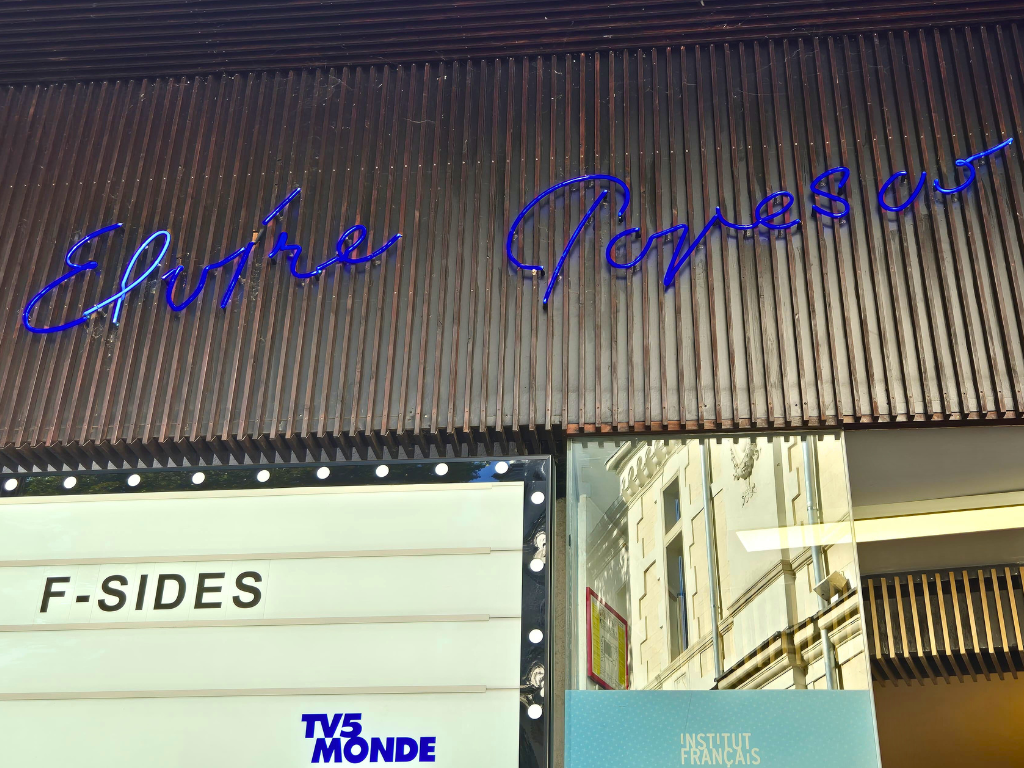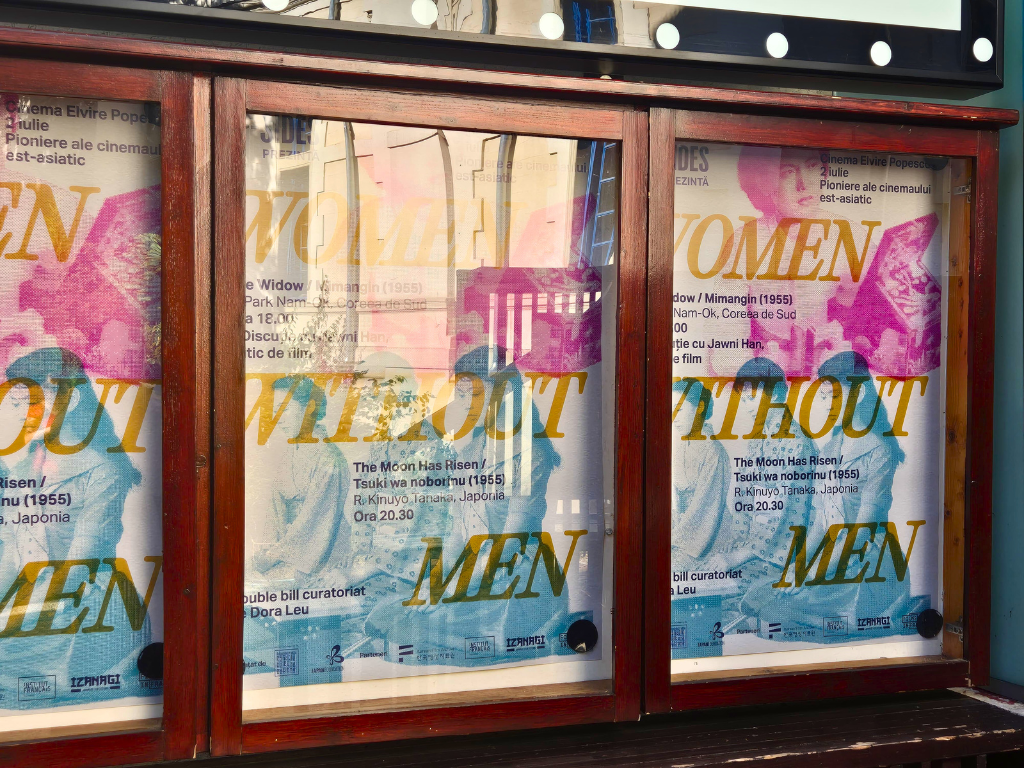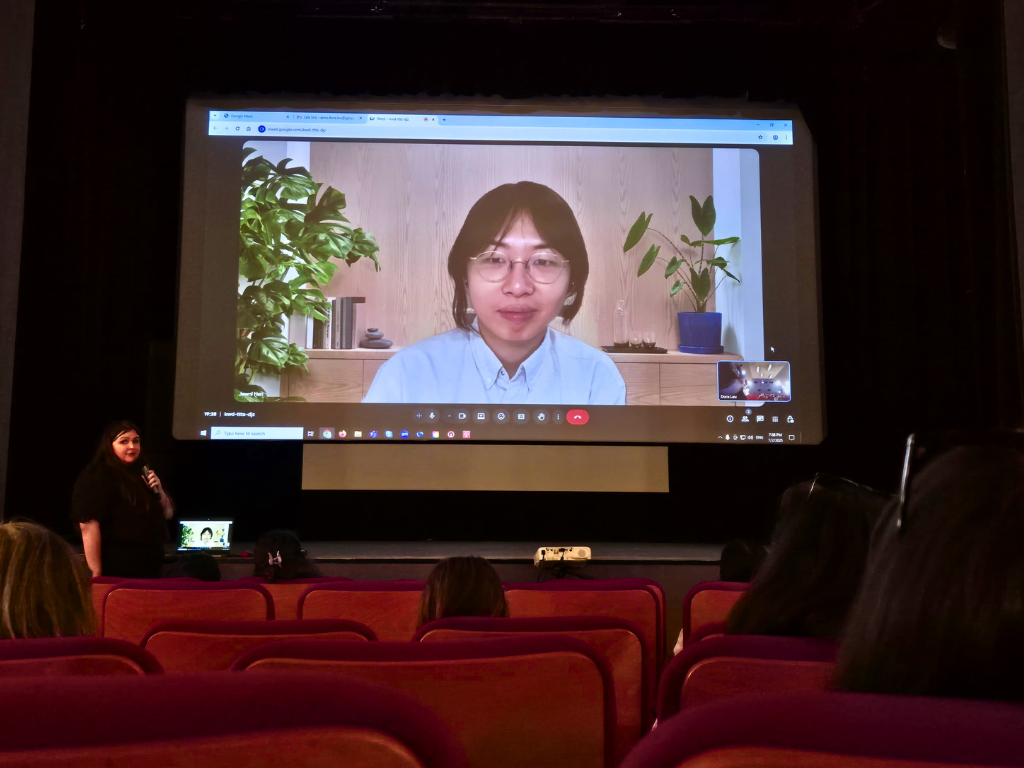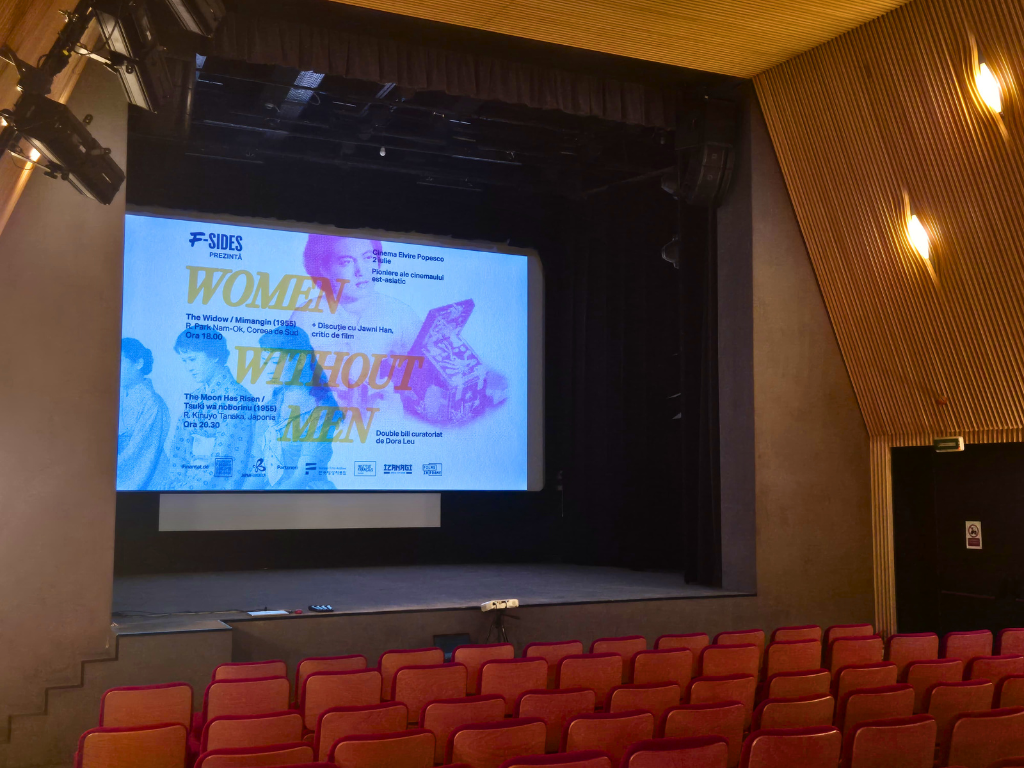In recent years, the global spotlight has increasingly turned toward the forgotten contributions of women in film history, revealing stories long buried beneath layers of industry bias and lost archives. One such story was brought to light in Bucharest through an evocative evening of cinema and conversation.
Curated by film critic Dora Leu, the double bill titled “Women Without Men”—featuring The Widow/Mimangin (1955, South Korea) and The Moon Has Risen (1955, Japan)—was screened on July 2, 2025, at Cinema Elvire Popesco. The event was organized by F‑Sides Cineclub in partnership with the Korean Film Archive (KOFA), Izanagi, the French Institute and Films in Frame, and was co-financed by AFCN and Japan Foundation.

The screening was followed by a rich post-film discussion between Dora Leu and Korean film critic Jawni Han, who joined via Zoom, shedding light on the historical and artistic importance of these two cinematic milestones, particularly Park Nam-ok’s The Widow, a film that continues to resonate as both a feminist and cinematic statement.
Dora Leu, who curated the program, is a Romanian film critic and programmer known for her focus on feminist cinema and East Asian film. She studied directing and film theory at UNATC and is a familiar name in contemporary film discourse across Central and Eastern Europe. Jawni Han, a filmmaker and critic based in Brooklyn, has contributed to publications such as Film Comment, Mubi Notebook, and The Brooklyn Rail, offering insightful perspectives on cinema through a trans and diasporic lens. Together, their dialogue brought local and global contexts into conversation, bridging Korean film history with contemporary feminist thought.
A voice ahead of its time
Park Nam-ok holds a unique place in Korean film history as the country’s first female director of a feature-length film. Her only work, The Widow, released in 1955, is an intimate yet bold depiction of a young widow navigating post-war life, societal expectations, and the complexities of female desire.
The film follows Shin-ja, a woman left alone to raise her daughter after the Korean War. Refusing to borrow money, she seeks help from a friend of her deceased husband, only to find herself entangled in emotional complications. When a young, attractive man unexpectedly enters her life, Shin-ja allows herself to imagine love and renewal. But as Dora Leu remarked, this love—frivolous, almost naive—carries with it the potential for danger and heartbreak. The widow’s choices are strikingly modern for the time, defying Confucian expectations around mourning and female chastity.

What makes The Widow extraordinary is the context in which it was created. As Dora explained before the screening, the version presented to the audience was unfortunately incomplete: the final reel has been permanently lost, and a ten-minute segment of sound is missing from the penultimate reel. Despite these gaps, the film remains visually and emotionally impactful.
Park’s determination to bring it to life, filming with her baby strapped to her back and cooking for the crew at night, adds a layer of mythos to the already legendary status of the film. She wasn’t allowed to participate in post-production sound editing simply because she was a woman—yet the final result is remarkably accomplished for the fragile state of Korea’s film industry in 1955.
Context and connection
Jawni Han provided important historical context for the film during the post-screening conversation. She spoke about Korea’s trajectory from Japanese colonial rule, through the devastation of the Korean War, and into the ideological and cultural uncertainty of the early 1950s. In this period of reconstruction, there was also hope—a sense that something new could be built, including in cinema. The Widow, according to Han, emerged from this unique window of possibility. Park had worked for years as a script supervisor and technician, gaining experience alongside prominent directors like Yoon Yong-kyu. That she managed to direct a film of her own in such a male-dominated industry was a remarkable feat.
Han drew comparisons with other notable post-war Korean films such as Hometown in My Heart (1949), a coming-of-age story made just before the Korean War, and A Flower in Hell (1958) by Shin Sang-ok, a film that explored themes of sex work and American influence with a strikingly realist approach. These films, like The Widow, broke away from traditional narratives and dared to portray Korean women in new lights. In The Widow, there is no moral judgment cast on Shin-ja for pursuing love again, even with a younger man. Similarly, her friend—a character subtly implied to be a sex worker—is treated with dignity and warmth. This absence of judgment was, as Dora emphasized, extremely rare for films of that period.

What connects The Widow with its Japanese counterpart in this double feature, The Moon Has Risen by Kinuyo Tanaka, is the shared theme of women navigating love and independence in a world that wants to control both. Tanaka’s film, a light-hearted story about three sisters and a secret matchmaking scheme, leans more into comedy and romance. Yet both films resist idealizing their female characters. They are allowed to be flawed, selfish, dreamy, or impulsive—fully human.
This freedom of representation, the shift of power toward women’s perspective, is what gives the "Women Without Men" program its emotional and historical force. As Dora remarked, these aren’t stories of women searching for husbands—they are stories of women searching for love, meaning, and autonomy. Whether widows or unmarried daughters, their journeys reflect a broader desire to escape prescribed roles and define their own futures.
Remembering through cinema
As a viewer, I found The Widow deeply affecting. Its atmosphere—the way people dressed, the makeup, the hairstyles, even the scenery—opened a window into 1950s Korea that felt immediate and tangible. I was especially moved by the silent segment, during which I had to imagine the characters’ conversations. That gap transformed the experience into something personal and participatory. I have always loved classic cinema, and this one had all the elements I adore: elegance, quiet rebellion, subtle humor, and emotional depth.

Ultimately, The Widow is more than a pioneering work—it is a lens through which we can re-examine the cultural and emotional lives of women in Korea’s post-war period. Though Park Nam-ok would never make another film—having emigrated to the United States shortly afterward—her legacy endures. Events like “Women Without Men” do the essential work of reviving and contextualizing these stories, ensuring they are not forgotten, and offering audiences new ways to connect with the past.
How about this article?
- Like0
- Support0
- Amazing3
- Sad0
- Curious0
- Insightful0


